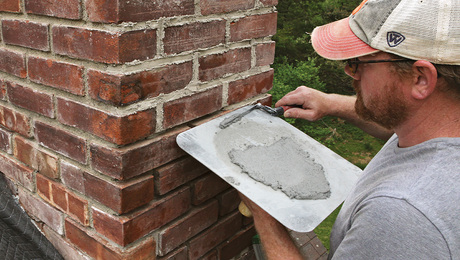My brother is making porch steps or some such and wants to know what you use to keep the concrete from sticking to the wooden forms. I told him that although it is probably not too “green,” as far as I know, you use (used) motor oil. Anything else, or better, or less ecologically polluting? I told him I supposed that if he could find used fryer oil from a fast food restaurant or salad oil or even linseed oil, those would work. I suppose you could use mink or emu or coconut or…but I think the price might be a little high! ( I suppose you could rub the forms with your hair, but I hate getting splinters in my scalp!)
Discussion Forum
Discussion Forum
Up Next
Video Shorts
Featured Story

Old masonry may look tough, but the wrong mortar can destroy it—here's how to choose the right mix for lasting repairs.
Highlights
"I have learned so much thanks to the searchable articles on the FHB website. I can confidently say that I expect to be a life-long subscriber." - M.K.
Fine Homebuilding Magazine
- Home Group
- Antique Trader
- Arts & Crafts Homes
- Bank Note Reporter
- Cabin Life
- Cuisine at Home
- Fine Gardening
- Fine Woodworking
- Green Building Advisor
- Garden Gate
- Horticulture
- Keep Craft Alive
- Log Home Living
- Military Trader/Vehicles
- Numismatic News
- Numismaster
- Old Cars Weekly
- Old House Journal
- Period Homes
- Popular Woodworking
- Script
- ShopNotes
- Sports Collectors Digest
- Threads
- Timber Home Living
- Traditional Building
- Woodsmith
- World Coin News
- Writer's Digest


















Replies
One such product.
http://www.bioblend.com/content/view/96/86/
Peanut butter! Smooth, not chunky.
------------------
"You cannot work hard enough to make up for a sloppy estimate."
m
wrap with plastic (poly) then reuse the poly for other uses.
I always spray the inside of form with diesel from a weed sprayer just before the concrete goes in the form
Thanks for the replies--I re-read my brother's email and it is a small stand he is making (not sure what size exactly), but not steps as I somehow pictured. So probably plastic film would be quick and easy and relatively non-hostile to the environment.
use vetable oil, how can it be harmful to the enviroment, its vegatblles
I second the veggie oil, I used the cheap store name brand.
How saturated does the form need or not need to be?
How saturated ....?
Saturation
We generaly just sprayed one coat of release oil on new or old forms. If for some reason we had to use regular playwood we would do a double coat of oil. Form board has more plys than standard plywood. I don't know why, but the less dense regular plywood seemed to drink the oil much faster then form board and it took to coats to make sure there weren't any dry spots.
Our old forms had been used so much that I think a third of the weight was from the oil in them. On large jobs we would assign one guy to spray or roll form oil on the forms before we started setting them. I've seen crews spray them after settint, but was tought that was wrong because it also got oil on the reinforcing steel and it ran down onto the footing. The oil is suppose to be a bond breaker,so getting on stuff you want the concrete to stick to was a no, no.
You can use boards with melamine too.
My GF and I have been casting concrete pavers, ply and 2x2 formwork. We've been using canola oil- seems to work just fine.
View Image
Use spray Pam - it works great.
Do not use automotive oils - a small amount can contaminate a lot of water.
Jeff
Edited 7/3/2009 11:25 pm ET by Jeff_Clarke
Quick/Cheap Fix to stop concrete from sticking to forms
I recently formed and poured 5 stairs and a 4x5 landing with concrete. I went to the internet to find solutions. As many noted, I have seen the "pros" spray diesel fuel to do the trick. This definitely works but for such a small job, I did not want to buy diesel/container and ruin my garden sprayer. Instead, I bought a spray can of Thompsons waterseal for $5 at Lowes and sprayed all the surfaces of the wood forms. It worked like a charm and I didn't have any problems getting the forms to release.
Hope this helps!
In addition to the replies above:
I know they use release agent for stamping etc. The concrete guys calle it "Bubblegum" because of the smell. Most concrete places have it.
If you google "Form Release Agent" you'll come up with a variety of brands you can buy commercially.
Form Release Oil
He can get a gallon of form release oil for about $8 at any concrete supply. Spray ,wipe or brush it on. For a small project a gallon is more than enough, so he will likely have enough left for another small job.
Not much danger of polution with form oil unless it is spilled or sloped arounf indiscremently. Most of it soaks into the form where it is suppose to be. We used the same forms for years of foundation work. On small jobs we sometimes didn't need to oil the forms. They were so saturated from previous jobs that it wasn't needed.
If he uses MDO forms, as I sometimes do for small precast work, he can wipe them with a layer of petroleum jelly. It works great on the really smooth surface of MDO, where oils tend to just roll off.
Form Release Oil
He can get a gallon of form release oil for about $8 at any concrete supply. Spray ,wipe or brush it on. For a small project a gallon is more than enough, so he will likely have enough left for another small job.
Not much danger of polution with form oil unless it is spilled or sloped arounf indiscremently. Most of it soaks into the form where it is suppose to be. We used the same forms for years of foundation work. On small jobs we sometimes didn't need to oil the forms. They were so saturated from previous jobs that it wasn't needed.
If he uses MDO forms, as I sometimes do for small precast work, he can wipe them with a layer of petroleum jelly. It works great on the really smooth surface of MDO, where oils tend to just roll off.
The data sheet has moved for the BioBlend Concrete Form Release
http://www.bioblend.com/pages/product-data-sheets
Well....
It has been several years since 2009.
some things take time.